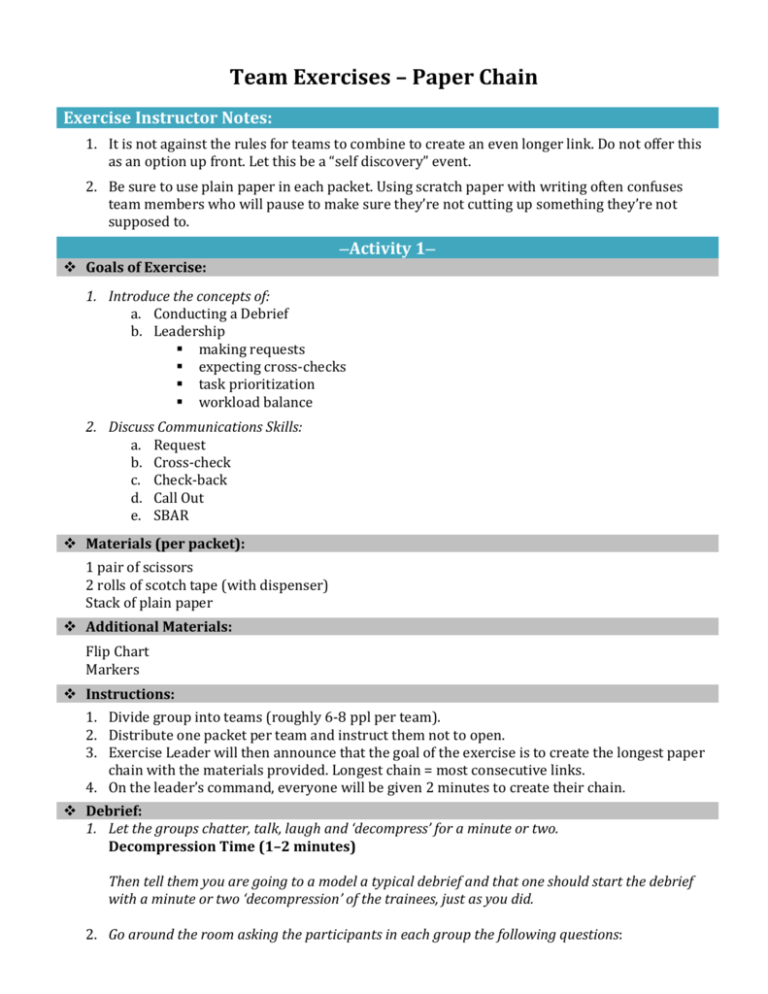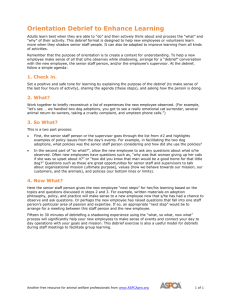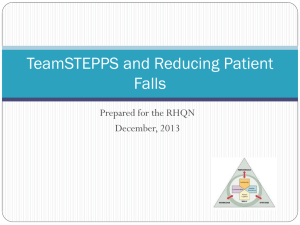Team Building Paper Chain Exercises: TeamSTEPPS Skills
advertisement

Team Exercises – Paper Chain Exercise Instructor Notes: 1. It is not against the rules for teams to combine to create an even longer link. Do not offer this as an option up front. Let this be a “self discovery” event. 2. Be sure to use plain paper in each packet. Using scratch paper with writing often confuses team members who will pause to make sure they’re not cutting up something they’re not supposed to. −Activity 1− Goals of Exercise: 1. Introduce the concepts of: a. Conducting a Debrief b. Leadership making requests expecting cross-checks task prioritization workload balance 2. Discuss Communications Skills: a. Request b. Cross-check c. Check-back d. Call Out e. SBAR Materials (per packet): 1 pair of scissors 2 rolls of scotch tape (with dispenser) Stack of plain paper Additional Materials: Flip Chart Markers Instructions: 1. Divide group into teams (roughly 6-8 ppl per team). 2. Distribute one packet per team and instruct them not to open. 3. Exercise Leader will then announce that the goal of the exercise is to create the longest paper chain with the materials provided. Longest chain = most consecutive links. 4. On the leader’s command, everyone will be given 2 minutes to create their chain. Debrief: 1. Let the groups chatter, talk, laugh and ‘decompress’ for a minute or two. Decompression Time (1–2 minutes) Then tell them you are going to a model a typical debrief and that one should start the debrief with a minute or two ‘decompression’ of the trainees, just as you did. 2. Go around the room asking the participants in each group the following questions: • • What went well, what did you good? What could you have done better? Tell them that by asking what they could have done better – in any debrief you are conducting – that the trainees will usually mention most of the improvement points you wanted to discuss, thus you will not be seen as just criticizing them 3. Starting with the groups that had the longest chains, go around the room asking the participants in each group the following questions: • What techniques or methods did you use for working well as a team when making the chains? • What hindered your group in working as a team? How did the additional time to plan affect your team's technique? How did the limited communication change it? Other Debriefing Notes: As participants respond, rephrase their responses back to them as TeamSTEPPS skills that will be covered in the training. If one of the skills is not brought up after each group responds, bring up that skill briefly afterward. • • • • • • • Someone assuming the leadership role — Point out a group in which someone assumed a leadership role and helped the team plan for the times when team members were no longer able to communicate verbally. If none of the groups had a member who did this, point out how this would have helped. Clearly defined team roles — Ask if any of the teams had designated people who agreed to take on certain roles (e.g., cutting the paper strips or taping). Ask if anyone was standing around wondering what to do because a clearly defined role was lacking. Task Prioritization Communication a. Making a Request Looking at the person from whom you are making the request Point at the person from whom you are making the request Cross-checks (i.e expecting ‘parroting’ of the request) Call-Outs (reporting to the leader unrequested information) SBAR (situation, background, assessment, recommendation) −Activity 2: NO TALKING− Goals of Exercise: 1. Introduce the concepts of: a. Conducting a Debrief b. Discuss concept of Situational Awareness 2. Discuss Communications Skills: a. Briefs a. Debriefs b. Huddles c. Handoffs d. SBAR Materials (per packet): 1 pair of scissors 2 rolls of scotch tape (with dispenser) Stack of plain paper 10 strips of pink paper (about 1” thick) 10 strips of blue paper (about 1” x thick) Activity 2 Algorithm Additional Materials: Flip Chart Markers Instructions: 1. Divide group into teams (roughly 6-8 ppl per team). 2. Distribute one packet per team and instruct them not to open. 3. Ask each group to identify a leader. The group leader will then leave the room to meet with the exercise lead for further instructions. 4. Outside the room, the exercise lead will introduce the group leaders to the Activity 2 algorithm. 5. Leads are instructed to share the information, but not show the algorithm to their group members. 6. The goal of the exercise is, again, to follow the included algorithm to create the longest paper chain with the materials provided. Longest chain = most consecutive links. 7. On the leader’s command, everyone will be given 2 minutes to create their chain (following the algorithm provided). Team Members CANNOT SPEAK. Debrief: 1. Let the groups chatter, talk, laugh and ‘decompress’ for a minute or two. Decompression Time (1–2 minutes) 2. Then tell them you are going to a model a typical debrief, and that one should start the debrief with a minute or two ‘decompression’ of the trainees, just as you did. 3. Go around the room asking the participants in each group the following questions: • What went well, what did you good? • What could you have done better? Tell them that by asking what they could have done better – in any debrief you are conducting – that the trainees will usually mention most of the improvement points you wanted to discuss, thus you will not be seen as just criticizing them. Other Debriefing Notes: As participants respond, rephrase their responses back to them as TeamSTEPPS skills that will be covered in the training. If one of the skills is not brought up after each group responds, bring up that skill briefly afterward. • • Situational Awareness Team Skills a. Brief b. Debrief c. Huddle d. Hand-Off e. SBAR −Activity 2 Algorithm− Start with white pieces of paper Cut into strips to make paper chain loops Make 3 loops of the chain Add blue loop Add White Loop Add pink loop Go to Step1 Repeat −Activity 2: NO TALKING, NO USE OF DOMINANT HAND− Goals of Exercise: 1. Introduce the concepts of: a. Conducting a Brief b. Discuss concept of Mutual Support 1. I’m Safe 2. Discuss Communications Skills: a. CUS b. 2-Challenge Rule c. DESC-It Materials (per packet): 1 pair of scissors 2 rolls of scotch tape (with dispenser) Stack of plain paper 10 strips of pink paper (about 1” thick) 10 strips of yellow paper (about 1” thick) 10 strips of blue paper (about 1” thick) with either a red or green dot clearly marked on the strip. Be sure to include a mixture of both red/green marked strips but the exact count of each can vary by group. Activity 3 Algorithm Additional Materials: Flip Chart Markers Instructions: 1. Divide group into teams (roughly 6-8 ppl per team). 2. Distribute one packet per team and instruct them not to open. 3. Ask each group to identify a leader. The group leader will then leave the room to meet with the exercise lead for further instructions. 4. Outside the room, the exercise lead will introduce the group leaders to the Activity 3 algorithm. 5. Leads are instructed to share the information (but only as much as directed in the algorithm), but not show the algorithm to their group members. 6. The goal of the exercise is, again, to follow the included algorithm to create the longest paper chain with the materials provided. Longest chain = most consecutive links. 7. On the leader’s command, everyone will be given 2 minutes to create their chain (following the algorithm provided). Team Members CANNOT SPEAK and CANNOT USE THEIR DOMINANT HAND. Debrief: 1. Let the groups chatter, talk, laugh and ‘decompress’ for a minute or two. Decompression Time (1 – 2 minutes) 2. Then tell them you are going to a model a typical debrief, and that one should start the debrief with a minute or two ‘decompression’ of the trainees, just as you did. 3. Go around the room asking the participants in each group the following questions: • What went well, what did you good? • What could you have done better? Tell them that by asking what they could have done better – in any debrief you are conducting – that the trainees will usually mention most of the improvement points you wanted to discuss, thus you will not be seen as just criticizing them Other Debrief Notes: As participants respond, rephrase their responses back to them as TeamSTEPPS skills that will be covered in the training. If one of the skills is not brought up after each group responds, bring up that skill briefly afterward. • • Mutual Support — I’m Safe Team Skills a. CUS b. 2 Challenge Rule c. DESC-It (Describe, Express, Suggest, Consequences) −Activity 3 Algorithm− Start with white pieces of paper Cut into strips to make paper chain loops Make 3 loop of the chain No more instructions until this is completed After 3rd Loop Add Blue loop If Next loop is pink If Next loop is Yellow No more instructions until this is completed Go back to Step 1







